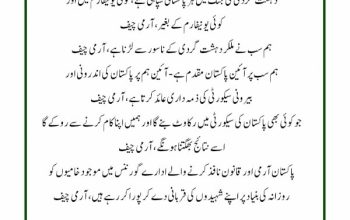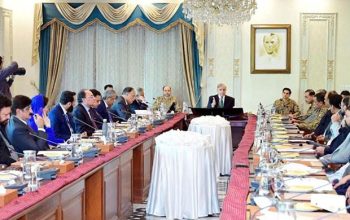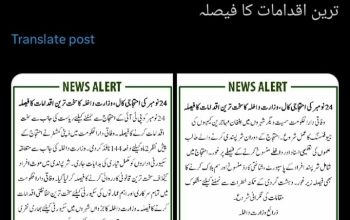So, they are out again, twisting facts with tongue in cheeks and throwing slur on the military. The post-truth brigade in Pakistan is now trying to douse the fire of 9th May under an ossified narrative: the military is the albatross hanging in Pakistan’s neck; it was and remains the mother of all problems.
The narrative keeps repeating the absurd logic that Pakistani military lost all the wars and the only war it won is against its own people. There is a need to set the record straight and apprise the post-truth brigade, most probably sponsored by PTI and its sympathisers, that things cannot be brushed under the carpet, history cannot be turned upside down and that 9th May cannot be forgotten through twisted logic.
Pakistan’s relationship with its neighbours and internal polity are continually impacted by the fact that it shares a difficult neighborhood with giants. Pakistan has been facing a two-front war for the last 20 years, with India on one side and an unstable Afghanistan on the other. Pakistan’s future was predicted to be grim and there was a narrative of Balkanisation of Pakistan by 2015.
In May 2020, a new strategic change occurred in the area bordering the Indo-China LAC in Ladakh. Approximately 2,500 square kilometers of Indian territory in occupied Ladakh was captured by China, while the third largest military in the world, India, was unable to mount a meaningful defence. Operation Swift Retort, carried out by the Pakistani military earlier in February 2019, restored nuclear deterrence in South Asia and demonstrated to the entire world that India was a paper tiger.
After the PTI leadership’s open attack on the state on 9th May, the fifth column within Pakistan as well as their sponsors abroad have started a brazen assault on the relationship between the Pakistan Army and the people of Pakistan. Some of poisonous themes parroted by the chaos brigade are to:
= Remind the populace that the Pakistan Army has been Pakistan’s albatross since its founding, and the time has come to abolish or trim down this institution.
= Stigmatise the Army’s contribution to national progress in the harsh and unrest-ridden regions of K-P, Balochistan, and even G-B, where troops and officers risk their lives in the line of duty.
= Fuel the Indian media with concocted information and a narrative that is hostile to Pakistan. Interestingly, the anti-Army narrative promoted by the post-truth brigade echoes in Indian media, immediately.
= Use the history of wars fought by the Pakistan Army to harm its reputation vis a vis the Indian Army and trivialise the sacrifices made by soldiers and officers with post-truth jokes, forgetting that the Indian Army, despite being larger, was always outsmarted by the Pakistan Army and her sister services.
The post-truth brigade needs a history lesson to put things in right perspective:
There is a factor of asymmetry in wars and conflicts, which affects conduct of war and critical decision-making. Wars fought by Finland, Japan, Germany, India, the US and Vietnam in the 20th century are glaring examples of asymmetric wars. If one looks at the end state of two World Wars, America’s Vietnam war, Sino-Indian War in the Himalayas; Germany, Finland, the US, India and Japan lost them squarely.
Finland fought the war against a larger Soviet Army in 1939, lost 9% of the area for good, mainly in areas of the Karelian Isthmus, both sides of lake Ladoga, Kainuu, as well as Salla and Petsamo in Lapland. This included a large industrial belt as well as some Islands in the Gulf of Finland. Despite these heavy losses, Finland still celebrates this war as a kind of victory, merely for the reason that it did not allow a bigger foe to capture more area.
Germany and Japan lost entirely in WW-II and had to surrender to allies. Are German and Japanese armies reminded daily of their surrender today?
In 1962, India was comprehensively defeated and lost a huge area measuring 38,000 square km to China in Aksai Chin as well as Arunachal Pradesh. More recently, Chinese military captured almost 2,500 sq kms of Indian territory in the disputed Ladakh region in 2020. Is the Indian Army condemned on a daily basis for such shameless conduct of war? The Indian Army claims that it took on a bigger foe and that in an asymmetric environment, it could do nothing more.
Pakistani military has fought three major wars as well as two significant conflicts against the Indian military. While 1948 Kashmir war was a clear victory, the 1965 war saw Pakistan Army and its sister services display grit and courage against a larger military of India. The 1971 war was a definite defeat due to the failure of the politico-military leadership to read the mind of their brethren in erstwhile East Pakistan. Even a Napoleon put into such a political environment could not have saved the day.
The Kargil War is still remembered as a tactical defeat of the India military by many Indian defence analysts. And more recently, in 2019, Operation Swift Retort of Pakistani military led by PAF highlighted the prowess and spirit of our pilots vis a vis India. Pakistani military has fought the longest war of its history since the US entry into Afghanistan. NATO, supported by four dozen hostile agencies, including India RAW, had given free hand to their agencies to undermine and even undo Pakistan. This was thwarted by Pakistan’s premier agency and Army through the support of the people of Pakistan.
The government and the key players in Pakistan should have a comprehensive understanding of the post-truth era and how it is affecting state security and governance. For that, we require a thoughtful discussion and an agreeable plan.
Attempts by the post-truth brigade to trivialise assault on the state by PTI thugs cannot succeed. The nation cannot be bluffed by a stereotyped ossified narrative against the state institutions and defenders of Pakistan.
Published in The Express Tribune, July 19th, 2023.
Like Opinion & Editorial on Facebook, follow @ETOpEd on Twitter to receive all updates on all our daily pieces.
Read the full story at the express tribune website.


